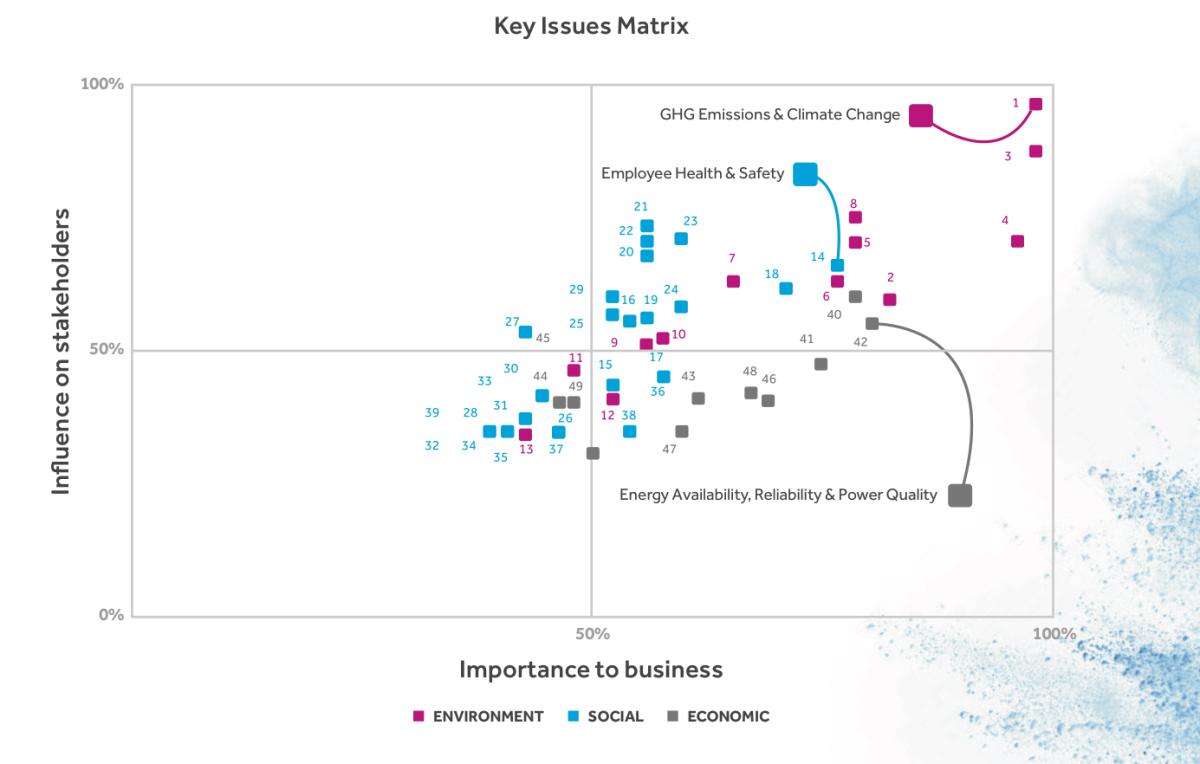NRG Energy | Key Issues Assessment Following GRI Framework

NRG Energy's 2016 Sustainability Report
NRG follows the GRI Framework to report on issues of importance to the company and its stakeholders. As part of a re-evaluation of our sustainability strategy, in 2013, we engaged a third party to facilitate a formal assessment to determine these key issues. Our initial assessment identified 49 issues as important to stakeholders and the NRG business. Selecting which of these issues to report on then involved a series of internal workshops and fed into the process for feedback received from regular engagement with our external stakeholders (see key issues matrix). We revisit this assessment annually to determine the content for the Sustainability Report. Key issues for NRG as delineated by the GRI Standards for 2016 include:
- Biodiversity
- Compliance
- Effluents and waste
- Emissions
- Employment
- Energy
- Occupational health and safety
- Procurement practices (supply chain)
- Water
We believe these aspects accurately represent the organization’s significant economic, environmental and social issues at this time. They also align with the key themes of the NRG corporate strategy and are the focus of our e orts to create robust targets and goals. These topics aim to cover all NRG brands and businesses. We do recognize, however, that some of these topics are more relevant to certain parts of the organization than others. For example, most of the environmental disclosure is focused on our power-generating fleet since that is where we have the ability to make the most impact through carbon-emission reduction and more efficient water use. Relevant financial implications, as well as a discussion of risks and opportunities associated with some of these issues, can be found in Part 1, Item 1A in our 2016 Form 10-K. Additional financial statements or equivalent documents can be found here.
Key issues assessment
To formally establish the process of defining key issues for sustainability, in 2013, NRG engaged a third party to conduct a preliminary formal assessment of key issues with internal stakeholders who represented diverse parts of our organization. Their input was solicited through surveys and an in-person workshop. In parallel, we prioritized our key issues according to a high-level, qualitative rating using existing NRG data and industry and external stakeholder resources.
In 2016, we revisited our key issues matrix to ensure that the findings remained relevant to NRG’s current business and operating environment. During this process, we interviewed more than 100 internal and external stakeholders, and their results were synthesized into an executive briefing document to share with NRG leadership. For the purpose of the Sustainability Report, these findings were also compared with external best practice publications on metrics, such as the Electricity Producers Research Institute Metrics for the Electricity Producers Industry, the Financial Stability Board’s Task Force on Climate Related Financial Disclosures, and the SASB Electric Utilities Standards.
The end result confirmed that the key issues NRG was reporting against were indeed the most pressing issues for the company at the time, and they remain relevant today.
The resulting matrix (see chart) illustrates what social, environmental and economic issues may have the greatest impact with regard to our business and stakeholders.
Today, we use this independent analysis to better inform business decisions and shape our voluntary reporting process. We’ll continue to develop and re ne this assessment on an annual basis, engaging a broader audience of internal and external stakeholders.
Key findings from the initial analysis include the following:
- Energy reliability, availability and power quality top our economic issues. The economic category includes issues that relate to the organization’s impacts on the economic conditions of its internal and external stakeholders and on economic systems at local, national and global levels.
- The environmental category includes issues that address the organization’s impact on living and non-living natural systems, including land, air, water and ecosystems. As a large power producer in the U.S., we need to be conscious of emissions.
- With thousands of employees working at various types of facilities, employee health and safety are the most material non-environmental issues. The social category encompasses issues concerning the impacts the organization has on the social systems within which it operates.
Download NRG Energy’s Sustainability Report here.
Learn more about NRG Energy’s sustainability initiatives here.

